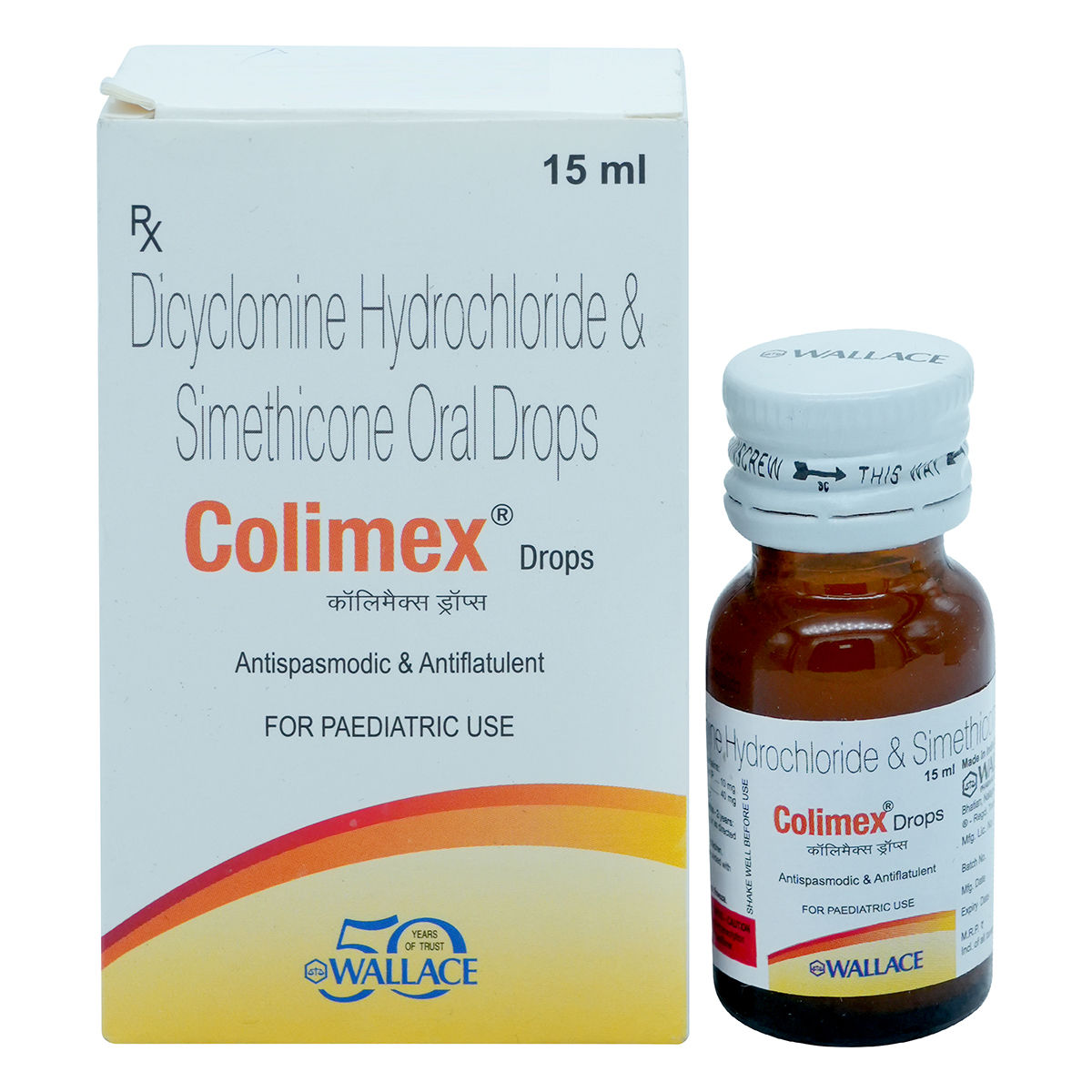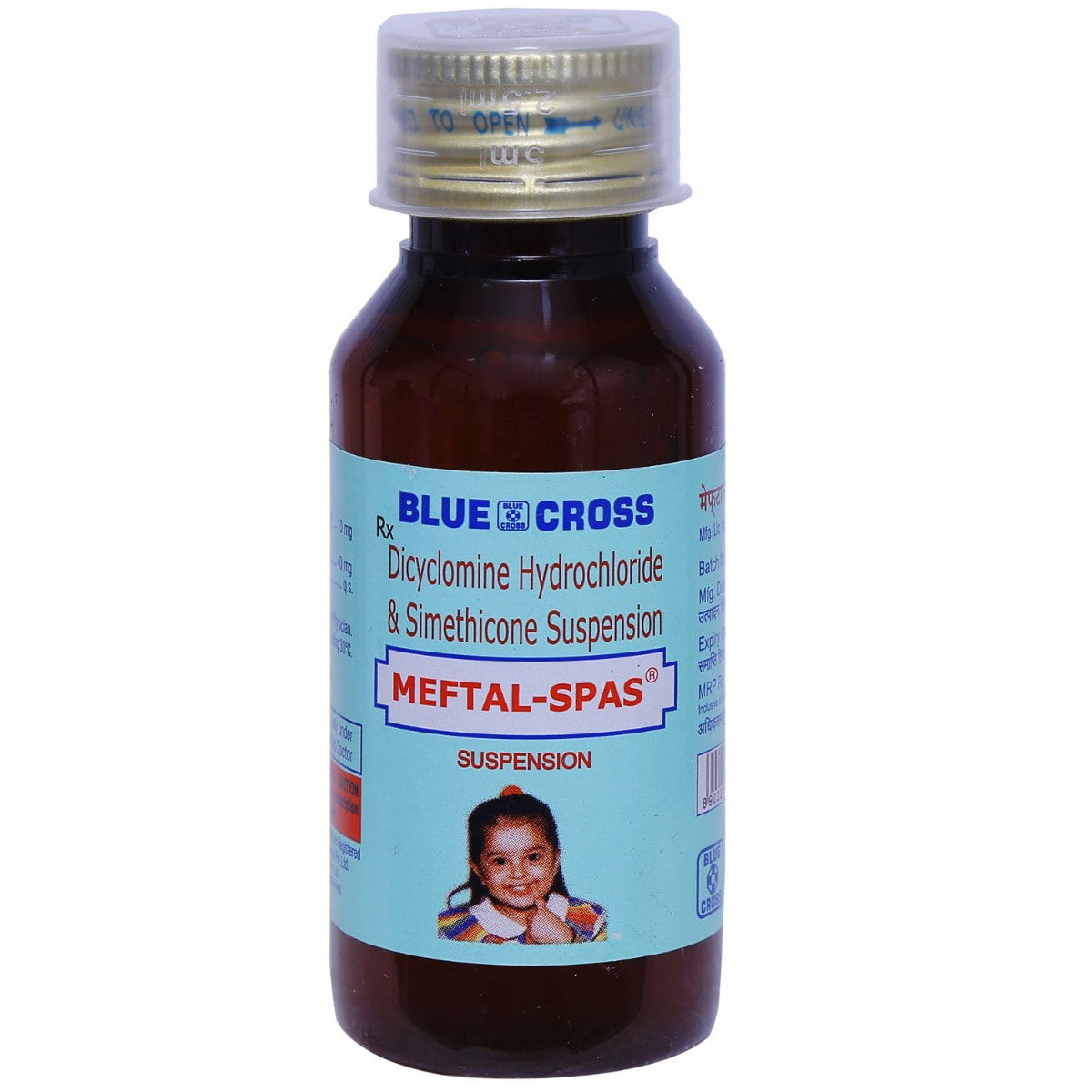Mefcolic Drop
₹24.93*
MRP ₹27.7
10% off
₹23.54*
MRP ₹27.7
15% CB
₹4.16 cashback(15%)
Free Delivery
With Circle membership
(Inclusive of all Taxes)
This offer price is valid on orders above ₹800. Apply coupon PHARMA10/PHARMA18 (excluding restricted items)
Provide Delivery Location

Whats That

Secure Payment

India's Most Trusted Pharmacy

Genuine Products
Composition
Consume Type
Return Policy
About Mefcolic Drop
Mefcolic Drop is used to reduce stomach pain due to spasms, cramps, and bloating. Abdominal spasms are the acute condition in which the abdominal muscles (abs), intestine and stomach contract severely. Stomach spasms can be caused by muscle strain, dehydration, stomach gas formation, inflammatory bowel diseases (IBD) like Crohn’s disease and ulcerative colitis, gastritis (stomach inflammation), pregnancy, constipation or other gastrointestinal infections.
Mefcolic Drop is a combination drug containing Dicyclomine and Simethicone, primarily taken to relieve period pain, spasmodic abdominal pain, bloating, and general pain-related discomfort of the lower abdomen. Dicyclomine is an antispasmodic agent that reduces spasms and pain by relaxing the muscles and blocking certain chemical messengers in the brain responsible for causing the sensation of pain. On the other hand, Simethicone is an anti-foaming agent that treats bloating and releases stomach gas more efficiently. Together Mefcolic Drop helps reduce muscle contractions and pain by acting on the intestine's inner lining, allowing gas bubbles to come together, relieving cramps and spasms.
Mefcolic Drop should only be if your doctor has prescribed you. It can be taken with or without food but at a fixed time for the best results. The course of Mefcolic Drop course should be completed as your doctor prescribes for better results. Some common side effects of Mefcolic Drop are dryness in the mouth, dizziness, weakness, nervousness, sleepiness, and nausea. Please consult your doctor if an allergic reaction becomes severe.
Mefcolic Drop is pregnancy category B medicines, so its use in pregnant and nursing mothers is safe if prescribed by a doctor. Do not consume alcohol as it may cause excessive drowsiness when taken along with Mefcolic Drop. Before using Mefcolic Drop, tell your doctor if you ever had an allergy to Mefcolic Drop, liver/kidney problems, irregular heartbeat, glaucoma, myasthenia gravis (muscle disease), hypertension (high blood pressure), gastroesophageal reflux, hyperthyroidism, benign prostate hyperplasia. Please do not drink alcohol with Mefcolic Drop as it may increase the unpleasant side effects like drowsiness and dizziness.
Uses of Mefcolic Drop
Medicinal Benefits
Mefcolic Drop is a combination drug containing Dicyclomine (antispasmodic) and Simethicone (anti-foaming agent), primarily taken to get relief from period pain, abdominal spasmodic pain, bloating, and general pain-related discomfort of the lower abdomen. Dicyclomine, being an antispasmodic, helps treat spasms and pain by relaxing the muscles. It also blocks certain chemical messengers in the brain, which cause pain sensation, hence relieving pain. Simethicone is an anti-foaming agent; it helps to treat bloating and releases gas more easily. Collectively, both help to reduce abdominal pain caused due to spasms, cramps and gas formation. Mefcolic Drop can be used both by men and women.
Directions for Use
Storage
Side Effects of Mefcolic Drop
Dryness in the mouth
Dizziness
Weakness
Nervousness
Sleepiness
Nausea
Drug Warnings
Tell your doctor if you are allergic to Mefcolic Drop, dicyclomine, simethicone, or any of its ingredients. Also, inform your doctor about all the prescription and non-prescription drugs. Mefcolic Drop is pregnancy category B medicines, so its use in pregnant and nursing mothers is safe if prescribed by a doctor. Do not consume alcohol as it may cause excessive drowsiness when taken along with Mefcolic Drop. Before using Mefcolic Drop, tell your doctor if you have liver/kidney problems, irregular heartbeat, glaucoma, myasthenia gravis (muscle disease), hypertension (high blood pressure), gastroesophageal reflux, hyperthyroidism, benign prostate hyperplasia. In case you have diarrhoea, consult your doctor before starting Mefcolic Drop as it could be harmful. Alcohol intake should be avoided as it may cause excessive drowsiness.
Drug Interactions
Drug-Drug Interactions: Mefcolic Drop is contraindicated when taken with antidepressants (e.g. amitriptyline, amoxapine, clomipramine, desipramine, doxepin), medicines used for heart problems (e.g. digoxin), anti-asthma (e.g. ipratropium), irritable bowel medications (e.g. propantheline, hyoscyamine), and pain killers (e.g. ibuprofen, naproxen).
Drug-Food Interactions: Alcohol should not be taken along with Mefcolic Drop to avoid unpleasant side effects.
Drug-Disease Interactions: Mefcolic Drop is contraindicated if you have liver/kidney problems, irregular heartbeat, glaucoma, myasthenia gravis (muscle weakness), hypertension, gastroesophageal reflux, hyperthyroidism (overactive thyroid), benign prostate hyperplasia.
Drug-Drug Interactions Checker List
- AMITRIPTYLINE
- AMOXAPINE
- CLOMIPRAMINE
- DESIPRAMINE
- DOXEPIN
- DIGOXIN
- IPRATROPIUM
- PROPANTHELINE
- HYOSCYAMINE
- IBUPROFEN
- NAPROXEN
Habit Forming
Diet & Lifestyle Advise
Opt for food and drinks high in Omega 3 fatty acids to get relief from pain, swelling, and inflammation. Omega 3 fatty acid-enriched foods include flaxseeds, walnut, soybean oil, salmon, and tuna if you prefer non-veg.
Try to fill half your food plate with fruits and veggies. Bananas and yoghurt taken with Mefcolic Drop may help protect your gut lining.
Limit salt intake and prefer herbs or spices like garlic, ginger, and turmeric, a natural anti-inflammatory.
Try to avoid alcohol as it can affect your stomach and intestine and limit the absorption of the essential nutrients required by your body.
Disease/Condition Glossary
Abdominal or Stomach spasm: It is a short-term or acute condition in which the abdominal muscles (abs), intestine and stomach contract severely. Stomach spasms can be caused by muscle strain, dehydration, stomach gas formation, inflammatory bowel diseases (IBD) like Crohn’s disease and ulcerative colitis, gastritis (stomach inflammation), pregnancy, constipation or other gastrointestinal infections.
Irritable Bowel Syndrome (IBS): It is also termed IBS colitis, mucous colitis, spastic colon, nervous colon, and spastic bowel. It is an inflammatory bowel disease that affects the large intestine. Symptoms of an IBS include abdominal pain, bloating, diarrhoea, mucus in stools, wind, constipation, tiredness, anxiety, depression, heartburn, indigestion, and headaches. IBS can be controlled by managing diet, excluding certain intolerant foods, lifestyle, and stress. It is more commonly found in people in their late teens to early 40s.
Menstrual cramps: When your uterus contracts and gets expelled during the menses period, hormones like prostaglandins get involved in triggering pain and inflammation. This, in turn, increases the uterine muscle contractions. So, higher levels of prostaglandins (pain hormone) are associated with more severe menstrual cramps.
Alcohol
Caution
Mefcolic Drop can cause excessive drowsiness and increase the risk of stomach problems.
Pregnancy
Safe if prescribed
Only consume Mefcolic Drop, if a doctor prescribes you.
Breast Feeding
Safe if prescribed
As the data around the use of Mefcolic Drop in breastfeeding women is limited, the use of Mefcolic Drop is restricted. It is highly recommended to consult your doctor before taking this drug in case you are breastfeeding.
Driving
Caution
Mefcolic Drop can cause dizziness or drowsiness. Use caution while driving or doing anything that requires concentration.
Liver
Caution
Mefcolic Drop to be taken with caution, especially if you have a history of liver diseases/conditions. The dose may have to be adjusted by your doctor.
Kidney
Caution
Mefcolic Drop to be taken with caution, especially if you have a history of kidney diseases/conditions. The dose may have to be adjusted by your doctor.
Children
Safe if prescribed
Generally, Mefcolic Drop is not recommended for children below six months with or without a doctor's consent. If it has to be given, then the dose must be adjusted and recommended by a child specialist only.
Country of origin
Author Details
We provide you with authentic, trustworthy and relevant information
FAQs
Disclaimer
Product Substitutes


















